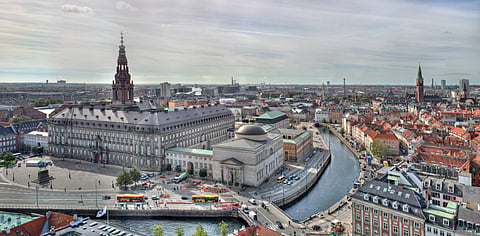

European Union leaders are intensifying discussions on a "drone wall" defense system along the bloc's eastern border in response to escalating Russian drone incursions into European airspace.
The initiative gained fresh momentum following recent violations, including drones entering Polish, Romanian, and Danish skies, as well as Russian fighter jets over Estonia.
At a summit in Copenhagen on Wednesday, officials from the EU's 27 member states addressed the project alongside trade and defense matters, underscoring the urgency amid heightened regional tensions.
The drone wall concept emerged from proposals by European Commission President Ursula von der Leyen, who highlighted the need for immediate action.
Russian drone activities have disrupted air traffic, prompting temporary bans on flights over Denmark and deployments of anti-drone systems to secure the summit.
Leaders emphasized that such incidents represent a pattern of hybrid warfare, necessitating a unified European response.
The drone wall would function as a coordinated network rather than a physical barrier, integrating radar, jammers, acoustic sensors, and enhanced data-sharing mechanisms to detect, track, and neutralize intruding unmanned aircraft.
Drawing on expertise from Ukraine, the system aims to create a joint shield covering the EU's eastern flank and allied territories.
NATO Secretary General Mark Rutte stressed the cost-effectiveness of prevention, noting that expensive missiles should not be wasted on low-cost drones.
European Commissioner for Defense and Space Andrius Kubilius identified advanced detection as an immediate priority, acknowledging current gaps in capabilities.
The broader initiative extends to improved maritime security and real-time space surveillance to monitor military movements more effectively.
Discussions also touched on timelines, with some leaders like Latvia's Prime Minister Evika Silina advocating for rapid implementation, warning that three years would be too long given drone technology's swift evolution.
Germany's Defense Minister Boris Pistorius cautioned against overpromising, suggesting realization might take several years.
Funding for the drone wall remains under debate, with the EU poised to develop a financial toolbox including grants and subsidies, as proposed by officials like Poland's deputy prime minister.
Leaders expressed determination to transition from planning to execution swiftly.
Lithuania's President Gitanas Nauseda remarked that documents alone cannot detect incoming threats from Russia or Belarus.
The summit also considered using frozen Russian assets to finance loans for Ukraine, a move condemned by the Kremlin as theft, though Russia denies involvement in the drone incidents.
As uncertainties loom over transatlantic commitments, the EU seeks to demonstrate preparedness and bolster support for Ukraine against Russia's ongoing invasion.
French President Emmanuel Macron called for pre-alert systems and deeper cooperation in light of the Danish overflights.
Finland's Prime Minister Petteri Orpo affirmed the need to strengthen defenses, while Denmark's Prime Minister Mette Frederiksen linked the events to a broader hybrid threat.
With political agreement, the project could advance quickly, signaling Europe's resolve to safeguard its skies.